外研版(2019)选择性必修第四册 Unit4 Everyday economics Starting out 优质课件(共24张PPT)
文档属性
| 名称 | 外研版(2019)选择性必修第四册 Unit4 Everyday economics Starting out 优质课件(共24张PPT) |
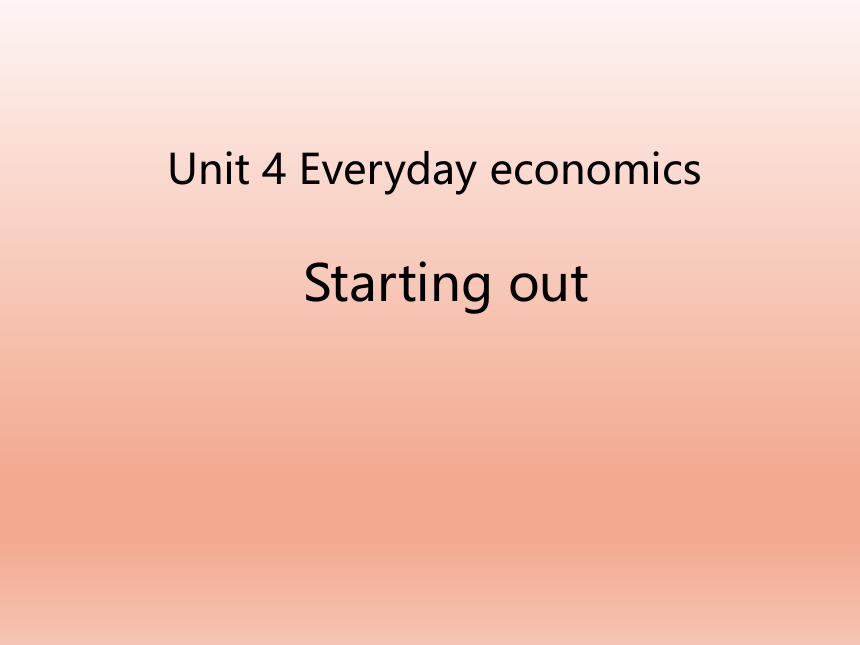
|
|
| 格式 | pptx | ||
| 文件大小 | 2.9MB | ||
| 资源类型 | 教案 | ||
| 版本资源 | 外研版(2019) | ||
| 科目 | 英语 | ||
| 更新时间 | 2023-03-07 00:00:00 | ||
图片预览

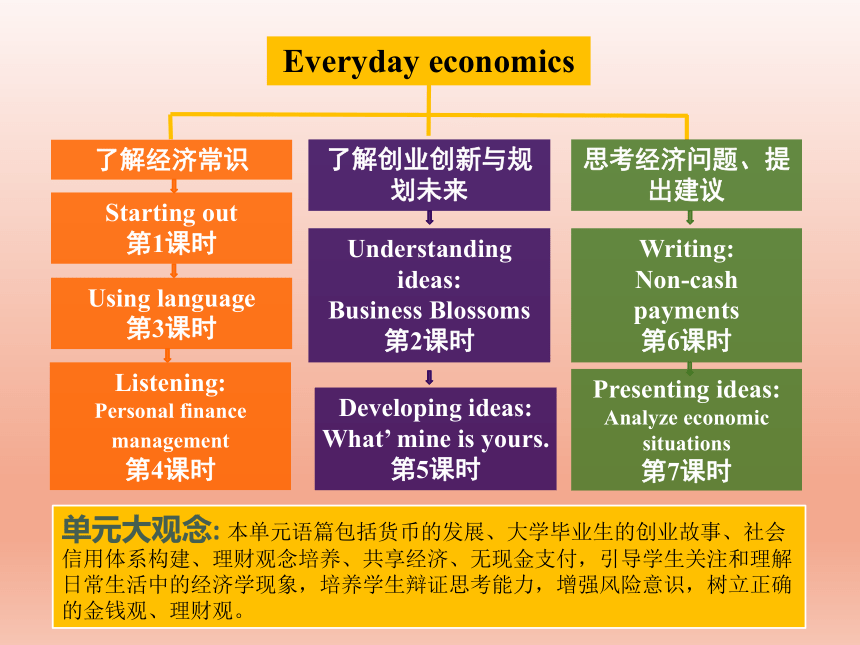
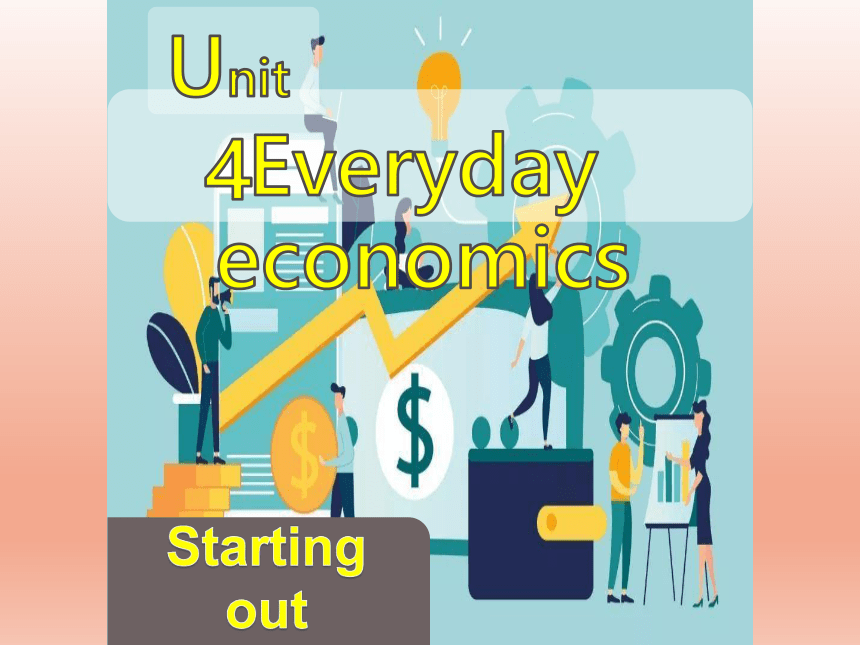
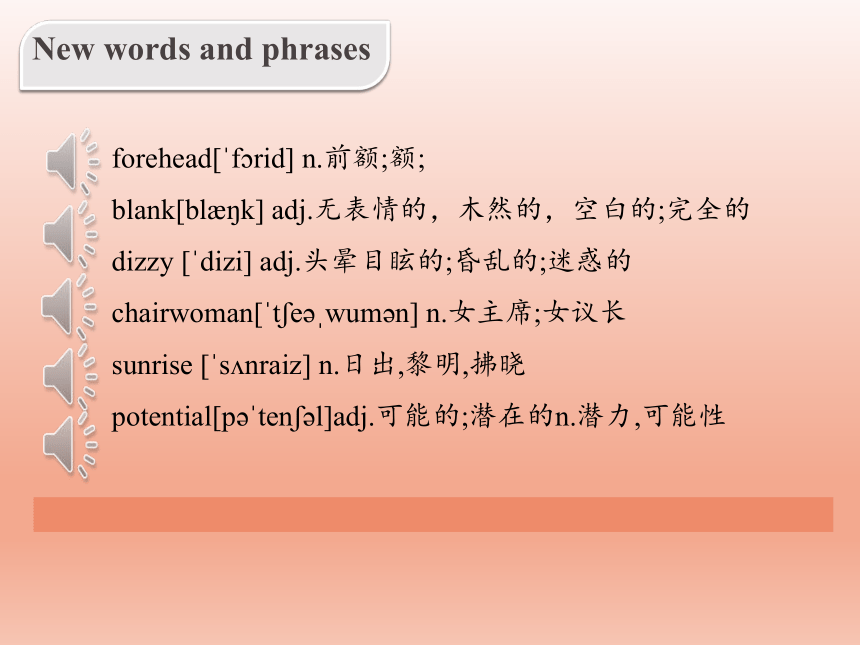
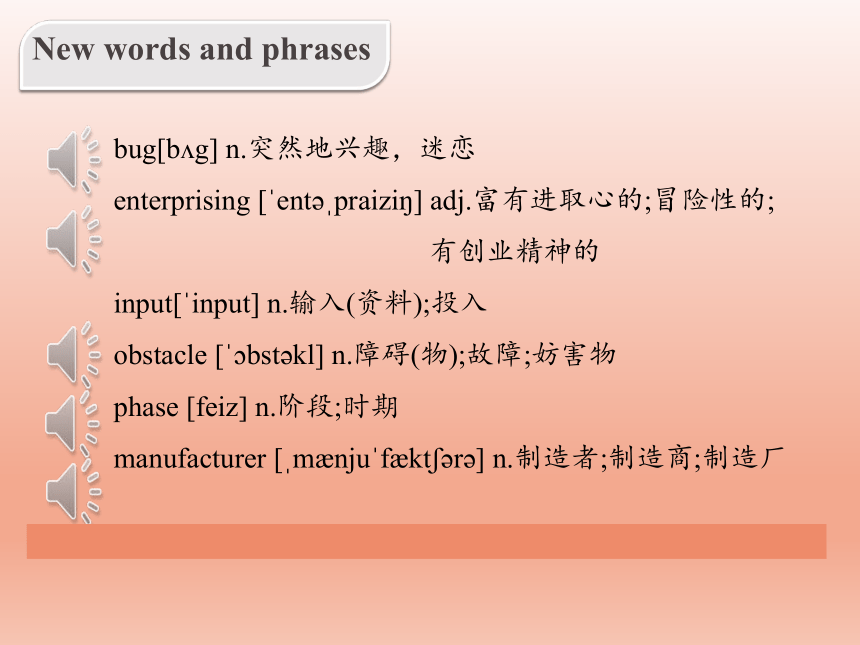
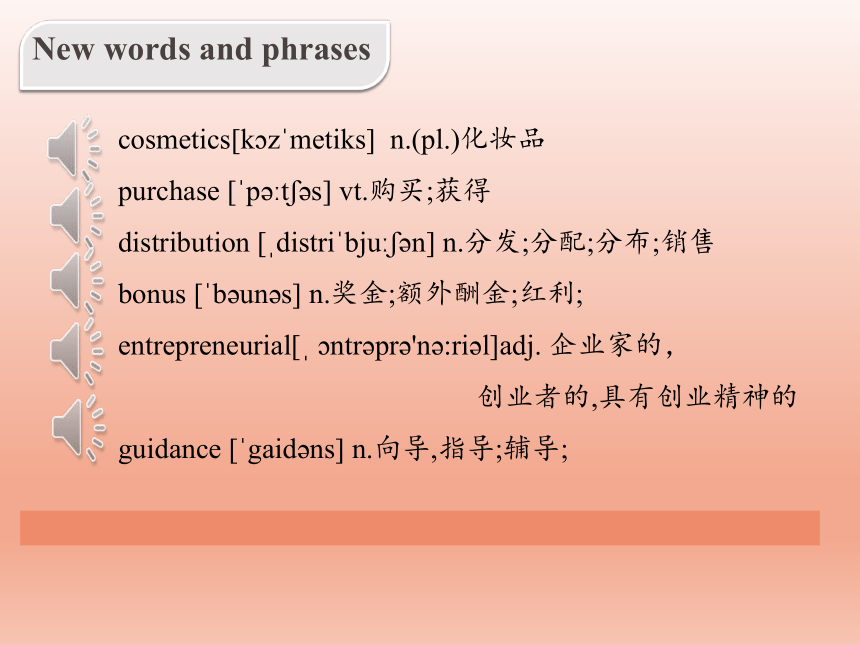
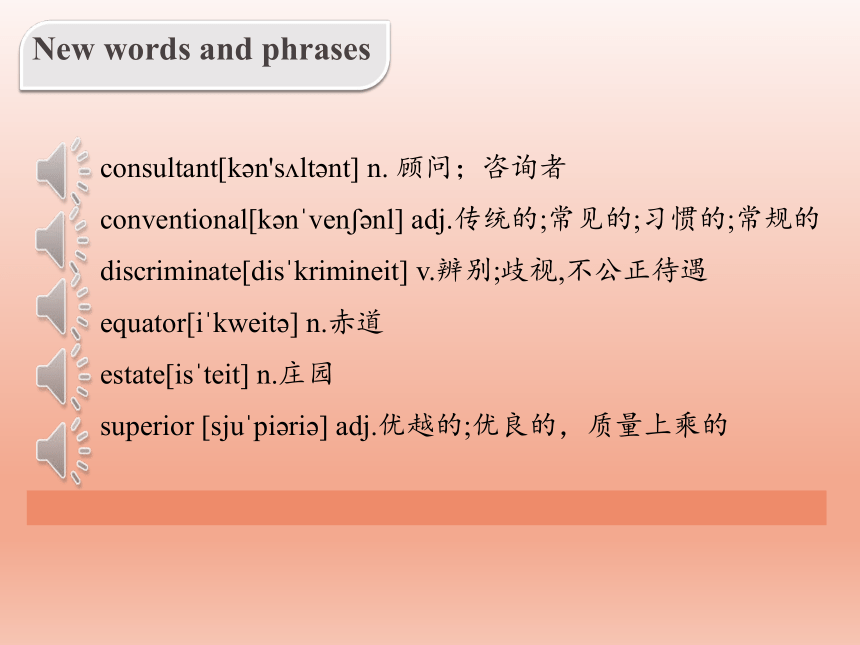
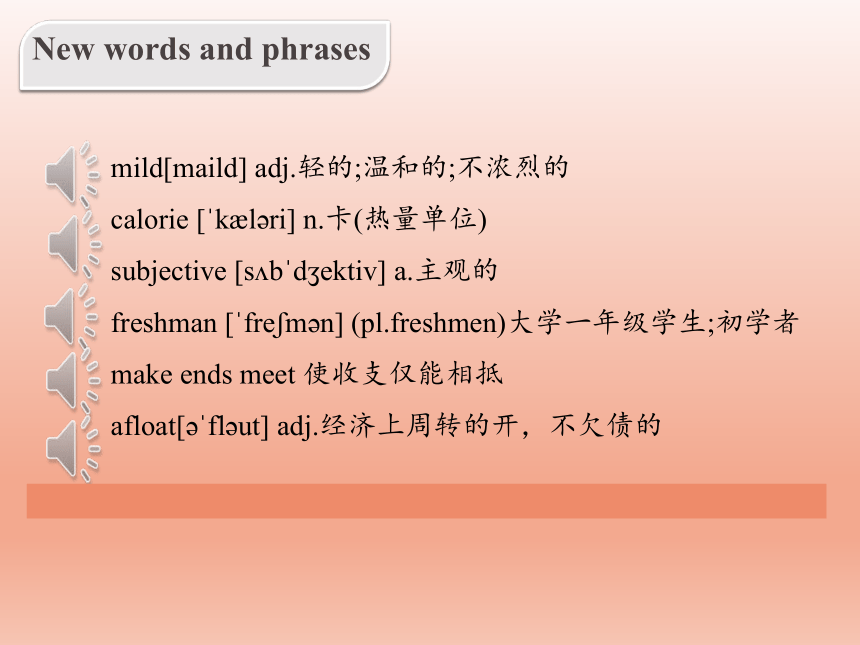
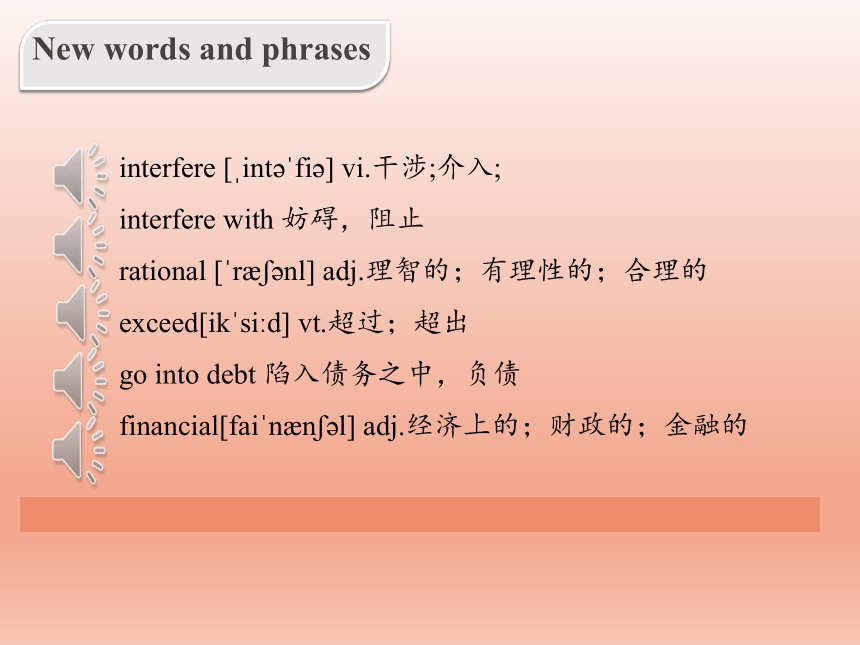
文档简介
(共24张PPT)
Unit 4 Everyday economics
Starting out
Everyday economics
了解经济常识
了解创业创新与规划未来
思考经济问题、提出建议
Starting out
第1课时
Using language
第3课时
Listening:
Personal finance management
第4课时
Understanding ideas:
Business Blossoms
第2课时
Developing ideas:
What’ mine is yours.
第5课时
Writing:
Non-cash payments
第6课时
Presenting ideas:
Analyze economic situations
第7课时
单元大观念: 本单元语篇包括货币的发展、大学毕业生的创业故事、社会信用体系构建、理财观念培养、共享经济、无现金支付,引导学生关注和理解日常生活中的经济学现象,培养学生辩证思考能力,增强风险意识,树立正确的金钱观、理财观。
Everyday economics
Unit 4
Starting
out
New words and phrases
forehead[ f rid] n.前额;额;
blank[bl k] adj.无表情的,木然的,空白的;完全的
dizzy [ dizi] adj.头晕目眩的;昏乱的;迷惑的
chairwoman[ t e wum n] n.女主席;女议长
sunrise [ s nraiz] n.日出,黎明,拂晓
potential[p ten l]adj.可能的;潜在的n.潜力,可能性
New words and phrases
bug[b g] n.突然地兴趣,迷恋
enterprising [ ent praizi ] adj.富有进取心的;冒险性的;
有创业精神的
input[ input] n.输入(资料);投入
obstacle [ bst kl] n.障碍(物);故障;妨害物
phase [feiz] n.阶段;时期
manufacturer [ m nju f kt r ] n.制造者;制造商;制造厂
New words and phrases
cosmetics[k z metiks] n.(pl.)化妆品
purchase [ p t s] vt.购买;获得
distribution [ distri bju n] n.分发;分配;分布;销售
bonus [ b un s] n.奖金;额外酬金;红利;
entrepreneurial[ ntr pr 'n :ri l]adj. 企业家的,
创业者的,具有创业精神的
guidance [ gaid ns] n.向导,指导;辅导;
New words and phrases
consultant[k n's lt nt] n. 顾问;咨询者
conventional[k n ven nl] adj.传统的;常见的;习惯的;常规的
discriminate[dis krimineit] v.辨别;歧视,不公正待遇
equator[i kweit ] n.赤道
estate[is teit] n.庄园
superior [sju pi ri ] adj.优越的;优良的,质量上乘的
New words and phrases
mild[maild] adj.轻的;温和的;不浓烈的
calorie [ k l ri] n.卡(热量单位)
subjective [s b d ektiv] a.主观的
freshman [ fre m n] (pl.freshmen)大学一年级学生;初学者
make ends meet 使收支仅能相抵
afloat[ fl ut] adj.经济上周转的开,不欠债的
New words and phrases
interfere [ int fi ] vi.干涉;介入;
interfere with 妨碍,阻止
rational [ r nl] adj.理智的;有理性的;合理的
exceed[ik si d] vt.超过;超出
go into debt 陷入债务之中,负债
financial[fai n n l] adj.经济上的;财政的;金融的
New words and phrases
accumulate[ kju mjuleit] vt.积聚;积累;堆积
automatically[ t m tik li] adv.自动地;机械地;无意识地
toddler [ t dl ] n.初学走路的孩子;
sorrow [ s r u] n.悲痛;遗憾;忧愁;不幸;伤心事
frustration[fr s trei n] n.懊丧,懊恼,沮丧
hire[ hai ] vt.(短期)租入;租出
New words and phrases
designer clothes 名牌服装
rent out 出租(房屋,房间,土地等)
thereby [ e bai] adv.因此,由此
supervision [ sju p vi n] n.监督,管理
expense [iks pens] n.消费;花费
at the expense of 以损害...为代价
abuse[ bju z] vt.滥用;虐待
theft[θeft]n.偷窃
purse[p s] n.钱包;皮包
拓展单词
1___________adj.有创业精神的,有进取心的_________n. 企业;事业;进取心;事业心
2.__________n. (商业的)分销,经销;发行___________v.(书报的)发生
3._______ n.指导,引导______v.引导,带领,操纵
4.___________ n. 顾问___________v. 商量,请教,当顾问
5.____________adj.传统的,常规的 _____________n.惯例,习俗
enterprising
enterprise
distribution
distribute
guidance
guide
consultant
consult
conventional
convention
6.___________v.不公正地区别对待,歧视____________n.歧视;区别,辨别
7.__________ adj.财政的,金融的;财务的_________ n. 财政;财政学;金融
8.__________v.积累,积聚____________n. 积累;堆积物
9.____________adv.自动地____________adj.自动的
10.___________n. 懊丧,懊恼,沮丧__________v. 使懊丧,使沮丧
discriminate
discrimination
financial
finance
accumulate
accumulation
automatically
automatic
frustration
frustrate
短语巧记
1.至于,关于 as to
2. 完全不同于 a world away
3. 一排又一排地 row upon row
4. 启程,动身 start out
5. 使收支仅能相抵 make ends meet
6. 妨碍,阻碍 interfere with
7. 陷入债务之中,负债 go into debt
8. 对....的回应 response to
9. 以最低价格 at rock-bottom prices
10. 出租 rent out
11. 以损害.....为代价 at the expense of
12. 受...影响,可能会受...影响 be subject to
Q1:What is money and
what is currency
Definition:
Lead in
Money is a medium that can be exchanged or traded for goods and services. Money can be used to measure the value of those goods and services at the current market price.
Currency is the paper money or coins that we carry around to make our day to day payments.
Q2:How did people make payments before money appeared
Example:
Exchange goods
Salt
Gold
Q3:How can people make payments now
Example:
Cash payment
Credit card payment
Mobile payments
1. What is the video about
Watch the video and answer:
2. What stages are mentioned in the video What are they like
The video is about a brief history of currency, or the development of currency.
Activity 1
Long before money was invented, people used _____________ to buy and sell things. A barter system is a way to _______________ ___________ for other goods and services.
a barter system
exchange goods
and services
Later, some goods became more widely accepted than others. These could be used to ________________ of other products and services.
calculate the value
Around the 11th century BC, Chinese people started to use __________________ to trade things. In the early stages, _____ of different shapes were used. The coins __________________ in the Qin Dynasty and started to take a ________ shape with a square hole through the middle.
small pieces of bronze
coins
were standardised
circular
There are different stages in the development of currency.
Around the year 1000, the Chinese began to use ___________. The Song Dynasty saw the __________________, which is said to be not only the first example of ______________ used in China, but also in the world.
Today, we have a modern system of ____________________, but this is continuing to ________ and _______ to other forms.
coins and paper notes
change
develop
paper money
paper currency
introduction of jiaozi
Pictures What activities What they have in common
1. What activities are shown in the pictures 2.What do they have in common
Activity 2
Paying coins for
some vegetables
Using an ATM card
To withdraw money
Donating money
to people in need
Paying through an
app on a smart phone
They all show
types of economic
behaviors, and
they are all related
to currency of
various forms.
3.What other economic activities are part of your daily life
On-line shopping
In-app Purchase, including digital goods or subscriptions
Example:
China is introducing a pilot program, the digital RMB.
What is it
Why move to it
What are the advantages
Can it be used
outside China
1. How did people make payments before money appeared Can you tell the development of currency
2. Can you list some economic activities in your daily life
Unit 4 Everyday economics
Starting out
Everyday economics
了解经济常识
了解创业创新与规划未来
思考经济问题、提出建议
Starting out
第1课时
Using language
第3课时
Listening:
Personal finance management
第4课时
Understanding ideas:
Business Blossoms
第2课时
Developing ideas:
What’ mine is yours.
第5课时
Writing:
Non-cash payments
第6课时
Presenting ideas:
Analyze economic situations
第7课时
单元大观念: 本单元语篇包括货币的发展、大学毕业生的创业故事、社会信用体系构建、理财观念培养、共享经济、无现金支付,引导学生关注和理解日常生活中的经济学现象,培养学生辩证思考能力,增强风险意识,树立正确的金钱观、理财观。
Everyday economics
Unit 4
Starting
out
New words and phrases
forehead[ f rid] n.前额;额;
blank[bl k] adj.无表情的,木然的,空白的;完全的
dizzy [ dizi] adj.头晕目眩的;昏乱的;迷惑的
chairwoman[ t e wum n] n.女主席;女议长
sunrise [ s nraiz] n.日出,黎明,拂晓
potential[p ten l]adj.可能的;潜在的n.潜力,可能性
New words and phrases
bug[b g] n.突然地兴趣,迷恋
enterprising [ ent praizi ] adj.富有进取心的;冒险性的;
有创业精神的
input[ input] n.输入(资料);投入
obstacle [ bst kl] n.障碍(物);故障;妨害物
phase [feiz] n.阶段;时期
manufacturer [ m nju f kt r ] n.制造者;制造商;制造厂
New words and phrases
cosmetics[k z metiks] n.(pl.)化妆品
purchase [ p t s] vt.购买;获得
distribution [ distri bju n] n.分发;分配;分布;销售
bonus [ b un s] n.奖金;额外酬金;红利;
entrepreneurial[ ntr pr 'n :ri l]adj. 企业家的,
创业者的,具有创业精神的
guidance [ gaid ns] n.向导,指导;辅导;
New words and phrases
consultant[k n's lt nt] n. 顾问;咨询者
conventional[k n ven nl] adj.传统的;常见的;习惯的;常规的
discriminate[dis krimineit] v.辨别;歧视,不公正待遇
equator[i kweit ] n.赤道
estate[is teit] n.庄园
superior [sju pi ri ] adj.优越的;优良的,质量上乘的
New words and phrases
mild[maild] adj.轻的;温和的;不浓烈的
calorie [ k l ri] n.卡(热量单位)
subjective [s b d ektiv] a.主观的
freshman [ fre m n] (pl.freshmen)大学一年级学生;初学者
make ends meet 使收支仅能相抵
afloat[ fl ut] adj.经济上周转的开,不欠债的
New words and phrases
interfere [ int fi ] vi.干涉;介入;
interfere with 妨碍,阻止
rational [ r nl] adj.理智的;有理性的;合理的
exceed[ik si d] vt.超过;超出
go into debt 陷入债务之中,负债
financial[fai n n l] adj.经济上的;财政的;金融的
New words and phrases
accumulate[ kju mjuleit] vt.积聚;积累;堆积
automatically[ t m tik li] adv.自动地;机械地;无意识地
toddler [ t dl ] n.初学走路的孩子;
sorrow [ s r u] n.悲痛;遗憾;忧愁;不幸;伤心事
frustration[fr s trei n] n.懊丧,懊恼,沮丧
hire[ hai ] vt.(短期)租入;租出
New words and phrases
designer clothes 名牌服装
rent out 出租(房屋,房间,土地等)
thereby [ e bai] adv.因此,由此
supervision [ sju p vi n] n.监督,管理
expense [iks pens] n.消费;花费
at the expense of 以损害...为代价
abuse[ bju z] vt.滥用;虐待
theft[θeft]n.偷窃
purse[p s] n.钱包;皮包
拓展单词
1___________adj.有创业精神的,有进取心的_________n. 企业;事业;进取心;事业心
2.__________n. (商业的)分销,经销;发行___________v.(书报的)发生
3._______ n.指导,引导______v.引导,带领,操纵
4.___________ n. 顾问___________v. 商量,请教,当顾问
5.____________adj.传统的,常规的 _____________n.惯例,习俗
enterprising
enterprise
distribution
distribute
guidance
guide
consultant
consult
conventional
convention
6.___________v.不公正地区别对待,歧视____________n.歧视;区别,辨别
7.__________ adj.财政的,金融的;财务的_________ n. 财政;财政学;金融
8.__________v.积累,积聚____________n. 积累;堆积物
9.____________adv.自动地____________adj.自动的
10.___________n. 懊丧,懊恼,沮丧__________v. 使懊丧,使沮丧
discriminate
discrimination
financial
finance
accumulate
accumulation
automatically
automatic
frustration
frustrate
短语巧记
1.至于,关于 as to
2. 完全不同于 a world away
3. 一排又一排地 row upon row
4. 启程,动身 start out
5. 使收支仅能相抵 make ends meet
6. 妨碍,阻碍 interfere with
7. 陷入债务之中,负债 go into debt
8. 对....的回应 response to
9. 以最低价格 at rock-bottom prices
10. 出租 rent out
11. 以损害.....为代价 at the expense of
12. 受...影响,可能会受...影响 be subject to
Q1:What is money and
what is currency
Definition:
Lead in
Money is a medium that can be exchanged or traded for goods and services. Money can be used to measure the value of those goods and services at the current market price.
Currency is the paper money or coins that we carry around to make our day to day payments.
Q2:How did people make payments before money appeared
Example:
Exchange goods
Salt
Gold
Q3:How can people make payments now
Example:
Cash payment
Credit card payment
Mobile payments
1. What is the video about
Watch the video and answer:
2. What stages are mentioned in the video What are they like
The video is about a brief history of currency, or the development of currency.
Activity 1
Long before money was invented, people used _____________ to buy and sell things. A barter system is a way to _______________ ___________ for other goods and services.
a barter system
exchange goods
and services
Later, some goods became more widely accepted than others. These could be used to ________________ of other products and services.
calculate the value
Around the 11th century BC, Chinese people started to use __________________ to trade things. In the early stages, _____ of different shapes were used. The coins __________________ in the Qin Dynasty and started to take a ________ shape with a square hole through the middle.
small pieces of bronze
coins
were standardised
circular
There are different stages in the development of currency.
Around the year 1000, the Chinese began to use ___________. The Song Dynasty saw the __________________, which is said to be not only the first example of ______________ used in China, but also in the world.
Today, we have a modern system of ____________________, but this is continuing to ________ and _______ to other forms.
coins and paper notes
change
develop
paper money
paper currency
introduction of jiaozi
Pictures What activities What they have in common
1. What activities are shown in the pictures 2.What do they have in common
Activity 2
Paying coins for
some vegetables
Using an ATM card
To withdraw money
Donating money
to people in need
Paying through an
app on a smart phone
They all show
types of economic
behaviors, and
they are all related
to currency of
various forms.
3.What other economic activities are part of your daily life
On-line shopping
In-app Purchase, including digital goods or subscriptions
Example:
China is introducing a pilot program, the digital RMB.
What is it
Why move to it
What are the advantages
Can it be used
outside China
1. How did people make payments before money appeared Can you tell the development of currency
2. Can you list some economic activities in your daily life
